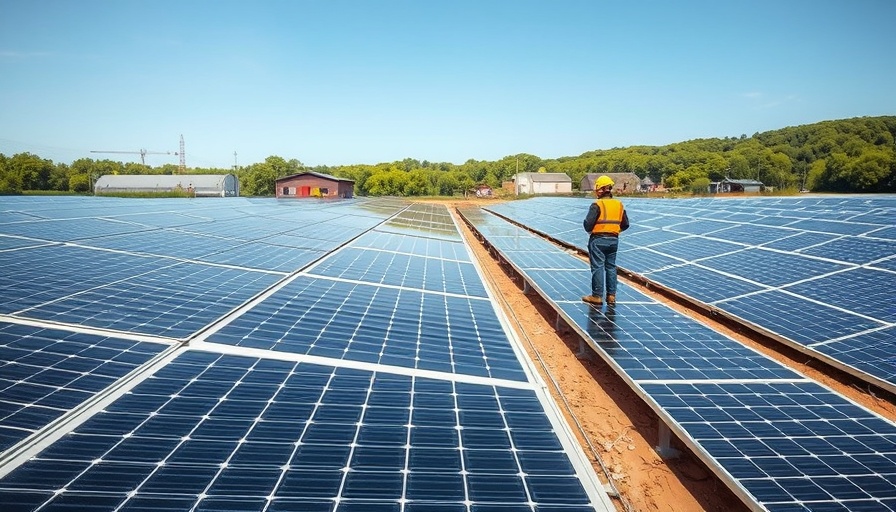
EDP's Vision for Solar Growth in Singapore
In the pursuit of a sustainable future, EDP Renewables, one of the world’s leading renewable energy providers, is urging the Singapore government to explore more stable and long-term land use rights for solar deployment. Currently, land leasing arrangements in Singapore are often temporary, which poses significant challenges for long-term solar installations.
Filipa Ricciardi, Asia Pacific Executive Director of EDP Renewables, highlighted the company’s commitment to enhancing solar capacity in Singapore, a city-state facing land scarcity. Despite attempts to maximize unused spaces, the temporary nature of land leases has hindered solar expansion, making it challenging to meet the increasing demand for clean energy from corporate investors.
Understanding the Nature of Land Leases
The prevailing land leasing system in Singapore provides licenses that are often limited to short terms, typically up to three years but can extend to 21 years under the JTC's SolarLand initiative. These licenses allow companies to convert temporarily vacant plots into solar farms, thus supporting Singapore’s goal of installing 2 GWp of solar energy by 2030.
However, Ricciardi advocates for a more extended lease period of up to 35 years, aligning better with the lifespan of solar panels, which is generally between 25 to 30 years. This would not only provide reassurance to developers but also attract more investments in renewable energy.
The Role of Corporations in Solar Adoption
As demand for solar energy surges, particularly from large corporations leveraging Power Purchase Agreements (PPAs), the need for a stable foundation for solar projects becomes paramount. According to Ricciardi, many companies are looking at solar as a viable power solution, emphasizing the need for more permanent land arrangements to foster growth and reliability.
The current instability around land usage rights creates uncertainty, inhibiting companies from potentially larger and more impactful investments in green technologies. As the corporate sector increasingly strives for sustainability, the importance of stable land access cannot be overstated.
Future Predictions: Solar Energy’s Trajectory
Looking ahead, the renewable energy sector is likely to face both challenges and opportunities in Singapore. If land use policies shift towards more permanent solutions, we might see a faster realization of the city's ambitious solar goals. In contrast, any continued preservation of the temporary leases might stall growth.
Moreover, the shift towards electric vehicles and other green technologies may further escalate the demand for renewable energy, spotlighting the importance of rebates or incentives for both consumer and corporate adoption of solar technologies.
Counterarguments: The Challenges Ahead
While calls for longer-term leases resonate within the renewable sector, it’s essential to consider the complexities involved. The Singapore government aims to optimize limited land resources, often prioritizing flexibility over permanence. Addressing concerns from urban planners about maintaining city functionality and ecological balance presents an ongoing challenge.
Critics may argue that the push for long-term leases could sideline equally valuable discussions around other sustainable practices, such as increasing the efficiency of existing solar technologies or investing in innovative space-saving structures that do not rely on permanent land ownership.
Community Insights and Corporate Responsibility
For eco-conscious readers, EDP Renewables’ situation exemplifies how corporate responsibility is intricately linked to sustainable development. As more corporations pursue eco-friendly products and initiatives, their advocacy can inspire broader shifts in environmental policy. The message is clear: fostering a sustainable community relies not only on individual actions but also on collaborative efforts between governments, corporations, and local populations.
Land-related issues present intricate vectors for environmental stewardship, impacting not just the companies involved, but the overall climate action ethos in Singapore.
Your Role in Promoting Renewable Energy
Citizens play an essential role in advocating for change. Engaging in community discussions, supporting local initiatives, and promoting policies that prioritize sustainable living can amplify the impact of corporations striving for a greener future. Encouraging local governments to adopt flexible policies can open doors to innovative renewable energy solutions while reducing the carbon footprint on the planet.
Conclusion: A Call to Action
As we reflect on the urgent need for clean energy solutions, it's essential for all of us to consider how we can contribute. Whether through supporting sustainable businesses or advocating for environmental policies that favor long-term solutions, each action counts towards a greener future.
For updates on sustainable practices, initiatives you can embrace, and ways to engage in climate action, stay connected with local environmental groups or subscribe to sustainability newsletters. Together, we can empower our communities toward a truly sustainable future.
 Add Row
Add Row  Add
Add 



 Add Row
Add Row  Add
Add 

Write A Comment